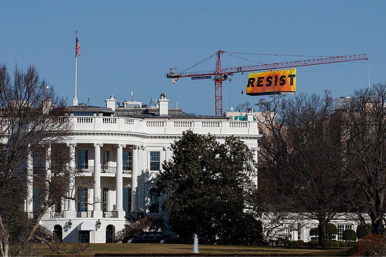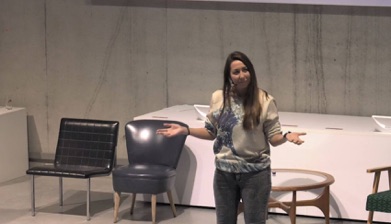A workshop for the reflexively impotent
-
-Alexander Roberts
Leftist thinker and activist Mark Fisher once coined the term ‘reflexive impotence’. It refers to a condition of inaction whereby people know very well that something is terrible, but have no belief that they themselves can change it, so they do nothing. Ant and Christophe’s workshop is an antidote.
As a dramaturg, curator and programme director for a Master programme – I am very busy with how we can support artists and audiences to make moves beyond rhetorical and critical acts in art towards acts of resistance and transformation. Ant and Christophe have developed a dramaturgical model for activism, which they introduce through this workshop, that supports that move.
With artistic and activist strategies as a blurry intersection upon which the workshop is built, Ant and Christophe provide a framework within which participants can question what capacities they have available to them for leaping beyond their apathy. The workshop enables participants to shift from the role of observer and critic of the realities they are entangled in, to intervenor and transformer of those realities. Furthermore – the workshop provides a mode of dramaturgical reflection that supports participants to maximise the impact of their activism. This is not an imaginary outcome either. The model can be used to dramaturge social and political activist strategies that will take place out there for real.

The Greenpeace action captured in this image captures the spirit their workshop calls for.
It is also very significant that there is no charismatic workshop leader standing before everyone. Like a somewhat less instructive Anarchist Cookbook, or less prescriptive Coming Insurrection, this workshop calls participants into action in solidarity with an anonymous many – not to the song of a singular awe-inspiring instructor.
In another sense, the Automatic Workshop is a factory of hope in a certain way. The kind of hope that Rebecca Solnit speaks of where hope is not “the belief that everything was, is, or will be fine”, because it’s clear that there is much to be troubled by in the world today – terrible suffering and destruction. Rather, for Solnit…
Hope locates itself in the premises that we don’t know what will happen and that in the spaciousness of uncertainty is room to act. When you recognize uncertainty, you recognize that you may be able to influence the outcomes—you alone or you in concert with a few dozen or several million others. Optimists think it will all be fine without our involvement; pessimists take the opposite position; both excuse themselves from acting. Hope is an embrace of the unknown and the unknowable, an alternative to the certainty of both optimists and pessimists. It’s the belief that what we do matters even though how and when it may matter, who and what it may impact, are not things you can know beforehand. You may not, in fact, know them afterward either, but they matter all the same, and history is full of people whose influence was most powerful after they were gone.
Ant and Christophe’s workshop builds itself out of the legacy of these people, the hopefuls, who had no idea if they would have an impact or not, but did it anyway. The workshop draws upon these Solnit-esque hopefuls and call upon workshop participants to become the same. Quit with the optimism, quit with the cynicism, and get busy with resisting and transforming the troubling social, political, ethical and ecological realities we are entangled with. They call the optimists and the cynics into the trouble, and provide them with a model for thinking that assists them in maximising their newly developed activist endeavours. What could be more urgent right now, than a factory producing Solnit-esque activist hopefuls?
An example of a THING
- Aili Voit

I wanted to share with you my incredible experience with your THE THING workshop; it inspired me a lot and created such an unexpected change at my workplace (which is European Commission).
My THING was to try to change the way we do presentations in the Commission and address our everyday work related problems. I always thought they are so dull and so repetitive and that there is this wrong understanding that Commission is a very serious institution so we must remain politically correct and abstain from any criticism. So by weird coincidence, I was asked to do a funny presentation about our (legal) work and so I somehow ended up doing a 17 minute stand up comedy (which I am a fan of but never have done myself before). It was truly only possible because I had pledged myself to do it as my THING that encouraged me to go through with it (even though I had major anxieties about it beforehand and I was struggling with self-doubt. In addition writing a comic script for the first time was an interesting journey).
In any case, I have never been in front of a 400 person audience, let alone reveal my critical humour to bunch of civil servants/strangers who are all much older than me. I also had a short intro, which was directly inspired by your workshop: where you were typing instructions to us as if you were behind the screen. I took inspiration from that and wrote some instructions on the screen and did a legal edit of that.
All in all, I received a standing ovation, which was completely unexpected and to this day (3 weeks later) I get recognised and congratulated by colleagues. I even was contacted by Commissioner's press person for more presentation work and the human resources asked for my CV. As you can see, it has been quite overwhelming for me, since I have worked in the same unit for 9 years and most people did not even know my name before.
But I am of course the most proudest of the fact that I pulled it off and as uncomfortable as it felt at times, I am quite happy that I managed to deliver something in the end that I am quite pleased with.
Thanks again for this wonderful workshop that was just so cleverly and well done and had all the elements of the THING itself.